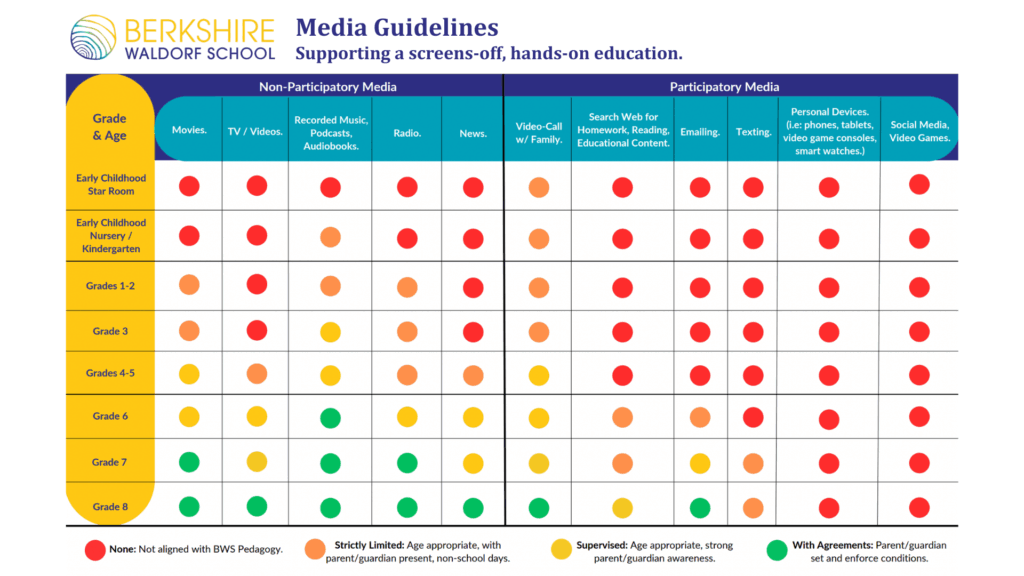Media Guidelines
“Pressure to grow up faster or exposing children to content or influences beyond their developmental ken does not make them smarter or savvier sooner. Instead, it fast-forwards them past critical steps in the developmental process.”
—Catherine Steiner-Adair, The Big Disconnect: Protecting Childhood and Family Relationships in the Digital Age

The Goal of Waldorf Education
The goal of Waldorf education is to develop capacities in children that will help them meet whatever the future brings—needs we cannot even guess at present. Central to this task is the ability to think with clarity, focus, creativity and flexibility. Electronic media and technology work against the development of these capacities. That is why the faculty of the Berkshire Waldorf School seeks to protect children from the detrimental effects of electronic media and technology, including TV, videos, movies, electronic and video games, computers, web sites, social media, texting, instant messaging, cell phones and other handheld devices, recorded music and radio.
Effects of Media and Technology on Children
Researchers of brain and human development continue to offer new insights that support our school’s limitation of media use in children’s lives.
Electronic media and technology use is linked with:
- Detrimental effects on the developing senses, nervous system and brain function
- Nervousness and lack of concentration
- Boredom and listlessness
- Inability to play or learn
The accumulation of repressed energy can lead to aggression and impulsive outbreaks. Children accept media characters as models for their own attitudes and actions, and begin to judge their own meaning, dignity and worth—and that of others—accordingly. The addictive and passive qualities of media and technology disrupt the child’s direct interaction with the world and interfere with their healthy development. In addition, rapid changes in technology have created new safety hazards for children, and the seemingly anonymous nature of social networking can lead to insidious new forms of social exclusion and harassment.
In the classroom, teachers see the compromising effects of children’s media and technology use in:
- Short attention spans
- Distractibility
- The need to be entertained
- Attention-getting behavior
- The inability to listen
- Weakened eye muscles caused by screen gazing hamper the ability and effort required to read, and compromise healthy vision.
- Erosion of the will and lack of initiative caused by media and technology use prevent children from being able to carry out their ideas.
Berkshire Waldorf School Media and Technology Guidelines
Teachers recognize that electronic media and technology can serve as valuable tools when used properly and age-appropriately. Certainly as adults we appreciate their assistance. In Waldorf education, students begin to work with these tools at the high school level. Here are the school’s recommendations for younger children:
For Students from Early Childhood through Grade 4
- BWS teachers request that the daily experience of the young child not include exposure to electronic media and technology, including computers and cell phones or other handheld devices/screens.
- Young children are best served by interacting directly with the three-dimensional world around them and with real people.
For Students Grades 5 and Up
- BWS teachers strongly recommend limiting media and technology exposure in the child’s daily experience.
- Limited viewing of carefully selected and supervised TV, videos or films may take place on weekends only (not on school nights, including Sunday).
- It is important that use remains limited and that parents be aware of content.
- Teachers strongly recommend that children grades 6-8 refrain from Internet access and computer use. If on occasion they do use the computer, please monitor and limit access, and have the child work in a visible family space.
- School research assignments will be based on library research or sources provided by the teacher, and other learning will take place in direct, hands-on ways.
- As with movies, please refrain from computer use on school nights.
- BWS teachers request no video games or online gaming under any circumstances, regardless of type of device used.
Cell Phones and Handheld Devices
- BWS teachers request that children not be provided with cell phones, iPhones or personal audio/video devices.
- On occasions when a cell phone may be needed for a child’s parental communication, please notify the class teacher in advance.
- Cell phone use is not permitted on campus, at school events or trips, or on school buses without a teacher’s permission.
- If a student has been given permission to have a cell phone at school, it must be turned off and kept in a backpack.
- Cell phones should be used only as phones and not for texting, messaging, as cameras, etc.
- To model conscious media use, we ask that adults also refrain from using cell phones, texting or using other electronic devices while moving through the school buildings, walking on campus grounds, and while dropping off and picking up their children.
Social Networking
- BWS teachers request that all students refrain from using electronic social networking sites. These not only pose safety threats, but also hamper students’ ability to interact with their classmates in socially healthy ways.
- Students should also refrain from interacting through email, instant messaging and chat rooms so that they can cultivate aware, empathetic and genuine interpersonal skills.
Media-Free Childhood
If parents are struggling to follow BWS media guidelines, or would like support on how to begin, please contact your class teacher. Many of our community members, parents and teachers alike, have met similar challenges in their family lives and can offer helpful, realistic suggestions. New after-school activities and offerings are being developed for this school year to help children stay active and engaged after the school day. In addition, the BWS Parent Association and BWS Media Working Group will keep you updated about parent education and support in finding fun family alternatives to children’s media and technology use.
Consequences of Media and Technology Misuse
If students misuse electronic media and technology, the following consequences will take place, for the well-being of all of the students in our school:
- Misused cell phones will be confiscated and parents will be contacted. After three such incidents, the student will not be allowed to have a cell phone at school. If text messaging is abused, parents will be asked to disable this feature.
- Personal audio or visual devices (iPods, etc.) will be confiscated and parents contacted.
- If a teacher observes a negative impact due to a child’s media use on the child’s individual or social behavior, or their academic performance, the parents will be invited to meet with the teacher and faculty administrator to find a solution.
For More Information
For further reading and more information about the effects of media use and Waldorf education, click here.







